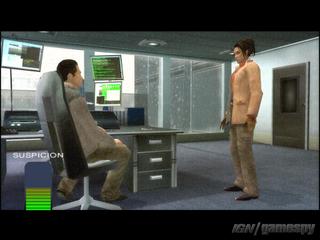Game Review: Indigo Prophecy
Platform: Playstation 2, XBox, PC
From the early eighties to mid nineties, some of the best video games were adventure games. As video games became more and more mainstream entertainment featuring increasingly shiny graphics, adventure games have become a dying breed. Games such as Maniac Mansion, Grim Fandango, Myst and Shadowgate have been replaced by Halo, World of Warcraft and Madden football. Every now and again a fine adventure game rears its head and sells barely well enough to keep the struggling genre viable. The last such game was The Longest Journey. Indigo Prophecy is another such game.
Indigo Prophecy has generally recieved positive reviews and has sold decently enough, though it is not on par with the other adventure games I mentioned. This is a sad fact, as it had the potential to be the best of the bunch. After the first couple of hours I was absolutely enamoured with this game, but the game's niggling little drawbacks kept picking at me until the game's end. The bad points certainly did add up, though the game has its good points, originality being chief among them.
First the good: The game opens on a brutal murder in the dirty bathroom in a small diner as the snow pours down outside the windows. You control the murderer who awakens as if from a trance to find a bloody knife in his hands and a dead body at his feet. Some 20 yards away, a cop sits at the counter nursing his coffee. You must find a way to get out of the diner without giving yourself away, and you must do so before anyone else enters the bathroom. After quickly cleaning things up as best I could, I calmly left the bathroom, left the payment for the bill on the table, walked out the door then took off like a bat out of hell down the street. My job was to avoid capture while trying to find out why this happened.
The game then puts you in control of the 2 investigators who come to check out the crime scene and look for clues. It's neat to see what you missed and what you gave away (my silly ass moved the body, washed my hands, mopped the blood up then left the bloody murder weapon on the floor for the cops to find.) The game has several options for interacting with your environments, as well as several dialogue options which are timed and cannot be initiated more than once. There are many instances where a botched puzzle or boneheaded conversation simply alters the story rather than making the player redo it by trial and error. This is a wonderful game mechanic and it gives the feeling of being a part of a real, interactive world rather than a static one. The idea of playing both the criminal and his pursuers is likewise very well done and it creates sympathy for both sides. The game has some interesting minigames as well as some intriguing decisions to be made that give the game replay value. For example, you see a child fall into an icy river. No one else sees this, but you see two cops (including the one from the diner) approaching. Do you save the child and risk capture or do you save your hide and leave the child for dead?
Now for the bad: The game is a fine interactive experience, and if they'd left it as strictly a dialogue/moral decisions/ solve puzzles adventure game, it would've been great. Instead, the game is full of on screen prompts which you have to mimic to advance through several areas of the game, almost constantly in fact. It is basically the equivalent of Dance Dance Revolution performed with 2 analog sticks. The other common one requires you to button mash the L1 and R1 buttons alternately. This sort of thing is simply irritating to have in an adventure game, it seemed like th game designers decided to arbitrarily throw in some fast paced button pushing to keep us from getting bored. Some areas it fits in context with the onscreen action (tapping the analog sticks to dodge things being thrown at you for example) but other times these onscreen prompts come up during dialogue or flashbacks. I was staring at the symbols on the screen and tapping my analog rather than being able to concentrate on the story and setting. This is unforgivable in a game that is all about immersion and story. The game also borrows pretty heavily from The Matrix and Silence of the Lambs among others.
Some of the minigames also seem forced. A basketball game? A boxing match? Two fucking STEALTH missions??? When I buy an adventure game, that's exactly what I want. Madden owners don't have side-scrolling action combat levels thrown in. Gran Turismo owners don't have to shoot terrorists during the course of the game. Give me what I paid for. Variety is good. Mixing genres isn't. Also, the story that starts out with so much promise eventually deteriorates into standard sci-fi crap, and the closer it gets to the end, the more the train goes off the track.
Indigo Prophecy is a unique, imaginitive, flawed game. This game makes me excited that there is still the possibility for art and imagination in the increasingly stagnant video game market. If Quantic Dream can build on this game and eliminate the negative points, they will give gamers something to be excited about. For the time being, however, Indigo Prophecy is a beautiful game with a lot of squandered potential.
Note: Indigo Prophecy is a fairly short game that could be finished in a weekend. I absolutely reccomend it as a rental.
Indigo Prophecy earns 2.5 wombats out of 4
















<< Home